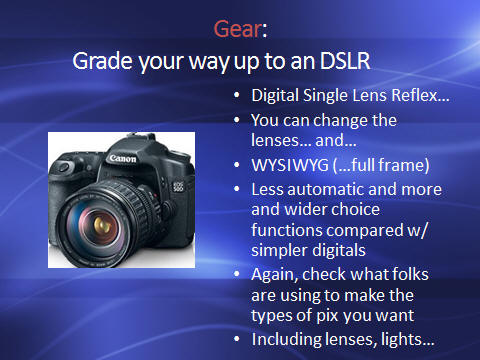 |
|
| Home | Marine Aquariums |
Freshwater Aquariums |
Planted Aquariums |
Brackish Systems |
Ponds,
lakes & fountains |
Turtles & Amphibians |
Aquatic Business |
Aquatic Science |
Ask the WWM Crew a Question |
| Please visit our Sponsors | ||||
 Many people "jump right in" and start using their photo et al. gear w/o reading the accompanying manuals, other inserts. This is a giant mis-step IMO. Do carefully read over all media that come with your gear, going over the features, buttons, what have you. I take these materials w/ me on all photo trips, and have never failed to learn something new and valuable by their perusal. Look at reviews on the Net (Amazon et al.) re after-market "how to" books, DVDs on using your gear and post production software. Some are very worthwhile. Additionally, do show/share your image work w/ other photographers, casually and at actual get-togethers for such sharing. There is no better way to learn than have other interested, similarly-engaged folks critique and enjoy your images. \  If/when you become "more serious" about image-making, do save up and purchase a digital single lens reflex camera (as opposed to a compact digital camera. There's more advantage than simply being able to change lenses here. Many new models have live views that are full frame (as opposed to cropped). Makes/models come and go, and it is impossible to give "advice" re what might work best for you. If you have lenses from a given manufacturer, it may be better for you to go with one of their DSLRs; otherwise adaptor rings exist to fit cross-models, and there are makers of other-branded lenses et al. that are almost as good and often significantly cheaper... The best input I can proffer is to go on-line, chat with folks who are trying to make the sorts of images you have in mind... READ what they're using, and why they do so.  Putting your knowledge into actual practice comes next. There is nothing like thorough familiarity with ones gear to grant optimized results. Hence, you're encouraged to get out, use the camera and related equipment as much as practical. David Doubilet once was asked how someone might improve my photo work. He asked, "How much film are you shooting?". I said, about a case a week. He said, "Oh, good". I said, wait a minute, what do you mean by a "case?"... To me this was a "brick" of twenty rolls... To him, it was a gross, 144 rolls!  Yes, there are courses of instruction in many aspects, some gear-specific in this field. Some can be found on the Net, a few are offered by manufacturers themselves, others are part of the academic experience. Don't be shy about showing up at local photo clubs, or joining/browsing the online ones. Image work is really all about sharing, and the best personal input you will find is through these associations.  Photo opportunities abound! Particularly for folks that "get about". Many aquarium clubs have regular "tank tours" going about to member's et al's systems. Public aquariums can also be useful for photo op.s, but do check w/ them re their photo policies. Some deny the use of flash (so you'll have to use higher ISO settings, longer exposures...). Consider coming out and visiting aquatic life where it occurs naturally. Lastly, how about your own systems and organisms? |
|

|
Features: |
|
| Featured Sponsors: |